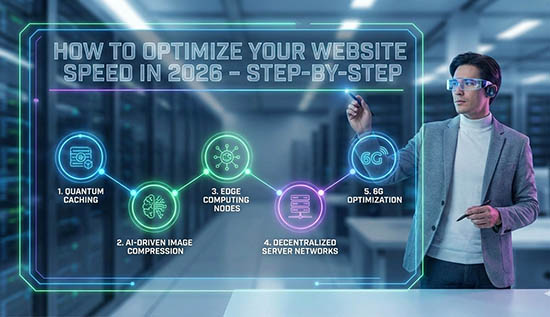How to Choose the Right Server Setup for Your Business

Learn how to choose the right server setup for business by understanding infrastructure needs, server types, and future growth.
Setting up the right server setup for business can significantly impact your company’s growth, security, and scalability. A strong foundation in small business IT infrastructure is essential to support operations, manage data, and serve clients efficiently. With so many options available, choosing a business server can seem overwhelming but understanding your business server requirements can make the process more manageable and strategic.
Whether you are launching a startup or scaling an established company, this guide will walk you through what matters most in a server setup for business. We'll explore the differences in server types, how to assess server performance, and why selecting the best server for growing business can be the key to long-term success.
Understanding the Best Server for Growing Business
Selecting the best server for growing business begins with an assessment of your present and future operational requirements. Your data volume, user count, software need and your team's access behavior all fall under this category.
Dedicated vs Cloud Server
A primary decision most companies face is dedicated vs cloud server. A dedicated server offers full control, ideal for businesses handling sensitive data or running high-performance apps. Conversely, a cloud server offers scalability and flexibility, which is ideal for expanding businesses and distant personnel. Your decision should show how much control, security, and customization your company requires today and in the future.
Server Solutions for SMEs
When it comes to server solutions for SMEs, cost-efficiency and reliability are crucial. Small businesses must balance their budgets without compromising server performance. Thankfully, modern solutions such as hybrid setups allow you to use both local and cloud servers, combining the benefits of each.
Investing in the best server solutions for company growth will assist to offset the risk of downtime or data loss if your firm expect a notable rise in consumer traffic, e-commerce data or internal software use.
How to Choose a Business Server That Aligns with Your Goals
This will show you how to choose the right server for your business to fit your digital transformation strategy and company objective. It's about building a system that supports data access, security and production as much as hardware.
- Scalability Matters: The server setup for business must support not only your current needs but also the projected growth over the next 3 to 5 years. This makes server performance and future readiness critical when making a decision.
- Security and Compliance: For industries like healthcare, finance, or e-commerce, secure data storage and regulatory compliance are non-negotiable. A proper server setup guide for companies should include security protocols, data backups, and access control settings.
Best Server Solutions for Company Growth: It’s important to choose infrastructure that can scale up as your team expands or as customer demand increases. Whether you go with a dedicated server for full control or a cloud server for easy expansion, both must meet your business server requirements while staying within budget.
Server Solution for SMEs That Make Sense
Small and medium-sized businesses (SMEs) should have server solutions that are straightforward, affordable and reliable. Your team's workflow, budget and long-term goal will help you decide between on-premise and off-premise configurations such in-house server against cloud or managed hosting. Although on-premise provides faster access and more control, cloud option increase uptime and lower maintenance.
Making the correct decision depends on assessing your company needs—data use, software requirements and file access frequency included. This guarantee that you spend sensibly—avoiding superfluous feature while preserving speed and capacity—keeping your system nimble and your team efficient.
Server Setup Guide for Company in the Growth Phase
A comprehensive server setup guide for company includes both technical and strategic planning. Start by identifying key performance indicators such as speed, uptime, and reliability.
Small Business IT Infrastructure Planning
Establishing a strong small business IT infrastructure is essential in building a trustworthy brand. It affects everything from customer service response times to internal operations. You must consider load balancing, network capacity, and software integration.
Performance Monitoring
Implement tools that help you monitor server performance in real-time. This allows your team to catch potential problems early and ensures a smooth user experience.
A structured approach toward server setup for business results in long-term savings, higher uptime, and seamless scalability. Your server isn’t just storage—it’s the heartbeat of your digital infrastructure.
Dedicated vs Cloud Server: What Should You Choose?
The ongoing debate of dedicated vs cloud server is common when businesses reach a growth phase. Each option comes with its pros and cons depending on your business model.
1. Dedicated Server Pros:
- Higher control over settings
- Stronger security
Better for data-sensitive industries
2. Cloud Server Pros:
- Scalable on demand
- Lower upfront costs
- Suitable for remote access
When you compare dedicated vs cloud server, consider your team's location of operation, your IT support resources, and your requirement for flexibility. Often, companies choose hybrid solutions to maximize both worlds.
Importance of Server Performance in Business Growth
Server performance plays a critical role in customer experience and operational efficiency. A slow server can lead to lost revenue, frustrated clients, and poor productivity:
- For e-commerce, poor server performance can result in abandoned carts.
- In tech or SaaS companies, server lag could disrupt collaboration and client service.
- In finance, milliseconds of delay might affect thousands of dollars in transactions.
Choosing a business server setup for business means optimizing these elements from the start to avoid costly downtime in the future.
Conclusion
A well-planned server setup for business is more than just a technical decision—it’s a strategic investment in your company’s future. By assessing your business server requirements, evaluating the pros and cons of dedicated vs cloud server, and selecting server solutions for SMEs that support flexibility and performance, you create a reliable infrastructure that drives growth.
Remember, the best server for growing business is not always the most expensive one but the one that aligns with your goals, fits your budget, and adapts to your growth. Whether you need a detailed server setup guide for companies or just want to improve your current system, taking the right steps now will save you money and stress later.
Frequently Asked Questions
1. What is the best server setup for business which is small?
Your data requirements, user numbers, and budget will determine the ideal configuration. For many, a hybrid solution or cloud server suffices.
2. How do I decide between a dedicated vs cloud server?
Select committed if you require great security and complete control. If you want flexibility, remote access and cheaper initial expenses also choose cloud.
3. What are the key business server requirements?
Included are storage, speed, uptime, backup system and scalability to fit your company expansion objective.
4. How frequently should I change my server configuration?
Every 12 to 18 months or when your company expands significantly, reevaluate your configuration to guarantee best server performances.
5. For small and medium-sized enterprises, is cloud hosting dependable?
Cloud hosting is a well-liked server solution for SMEs since it provides great uptime, remote access, and scalability.
More Articles
 20 Dec 2025
20 Dec 2025
How to Optimize Your Website Speed in 2026 – Step-by-Step
Smart strategies for how to optimize your website speed in 2026 using modern tools, performance techniques and SEO-focused improvements.
 19 Dec 2025
19 Dec 2025
Must-Have Software for Developers 2026 – Top Tools & Apps
Must-have software for developers 2026 covering coding tools, productivity apps, and essential platforms used by front-end, full-stack, and mobile developers.
 18 Dec 2025
18 Dec 2025
VPN vs Proxy for Business: Which Is Safer & More Secure
VPN vs Proxy for business security explained with real use cases, comparisons and guidance to choose safer remote access solutions.
 17 Dec 2025
17 Dec 2025
Key Lessons & Best Practices from Digital Transformation
Key lessons from successful digital transformation projects, including best practices, common challenges, and effective implementation strategies.